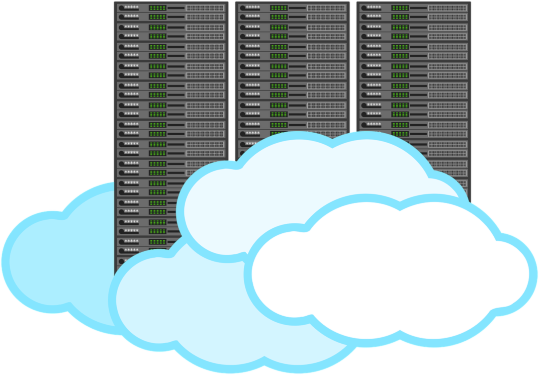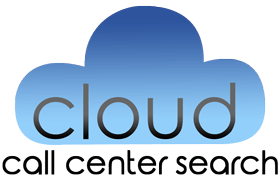On-Premise vs. Cloud Call Center Software
If you are looking to invest in new call center technology, the first step is to determine your deployment model. Whether you are currently using on-premise hardware, cloud software, a hybrid, or a homegrown solution, it is critical to understand the strengths and weaknesses of each deployment model to make the decision that is best for your business and customer experience goals. So what is on-premise vs cloud call center software?
Are you ready to improve the experience for your customers and your agents with a cloud-based contact center? Get started with a free cloud technology consultation.

On-Premise vs Cloud Call Center Comparison
What is On-Premise Call Center Software?
A premise solution is a more traditional model of deployment in which all hardware and software is stored in a single location, on-site at your organization. On-premise systems often require upgrades as well as an internal IT team to manage the onsite installation, new hardware setup, customization, maintenance, and upkeep.
What is Cloud Call Center Software?
Unlike premise call center software, cloud based call center solutions are hosted in the cloud. Software as a Service (SaaS) solutions typically provide companies with cost savings as well as operational benefits. Cloud call center software as a service (CCaaS) solutions are managed and maintained by the cloud provider allowing companies to focus on their core competencies instead of employing large IT teams to manage hardware. The call center data and user interface are hosted on the cloud, making it accessible to users anywhere there is an internet connection.
Hybrid Software Solution
There are pros and cons to both cloud software and premise solutions. Because of this, some companies may choose to deploy a hybrid software solution. A hybrid solution can provide a company with more control over their data but in exchange has some of the drawbacks of premise call centers. It may also be cheaper than an on-premise solution, but it is less flexible, less secure, and requires ongoing maintenance.
On-Premise vs Cloud Contact Center Comparison
Now that we have briefly defined premise, cloud, and hybrid deployment models, we can look at the core differences of on-premise vs cloud contact center software as well as the benefits of choosing a cloud contact center solution.
There are a lot of things you need to consider when comparing on-premise and cloud call center software. The cost structure of each model is drastically different as is the functionality, maintenance, equipment, and data integrity. These differences could be the difference between providing mediocre and exceptional customer experiences.
Initial Costs/Set-Up Costs
One of the biggest criticisms of premise solutions is that the software and hardware must be paid for upfront in a lump sum. This can be a tremendously large capital expenditure for a company of any size and makes on-premise solutions unviable for smaller businesses. Unlike premise solutions, cloud solutions have very low set-up costs because usage is paid for on a pay-as-you-go model. With this payment model in place, the only initial cost of implementing a cloud solution is the set-up or onboarding fee.
Ongoing Costs
When partnering with a cloud call center vendor you will commit to paying a monthly subscription fee, where you only pay for what you use, eliminating the significant upfront investment common with premise contact centers. Although premise solutions are purchased upfront, there are also hidden ongoing costs. Equipment must be maintained, so hiring an internal IT team to manage the hardware and software is necessary. On-premise technology also needs to be upgraded every five to seven years.
Deployment & Implementation
An on-premise call center typically takes several months to implement. Because cloud solutions work out-of-the-box, they can be implemented in a matter of weeks or even days. This provides companies with a quicker return on investment.
Training
With newer cloud solutions, less training is necessary compared to legacy systems. Additionally, because agents work on a single desktop in the cloud, they can spend less time hopping between software systems and focus more on customer satisfaction and increased productivity. Agent turnover is also lower in companies with cloud software because it provides additional ease-of-use as well as virtual work-from-home options.
Collaboration
On-premise technology must be located on-site, therefore, companies with multiple locations or call centers must have different sets of hardware and software. This can create silos and make it difficult or even impossible for different locations to collaborate and share call center analytics and customer data. With a cloud offering, you can choose a single-tenant cloud or multi-tenant cloud depending on your business needs. A single-tenant across all geographically dispersed centers allows agents and call center managers to share information and collaborate seamlessly.
Stability
Although on-premise technology can help companies avoid latency or inadequate call quality, there is a reliability risk involved when relying on physical hardware or equipment that can break down. Cloud technology has become increasingly reliable and most vendors offer uptime SLAs of 99.99% or greater. This is equal to less than one hour of downtime per year, which can be hard to find with an on-premise solution.
Flexibility
A cloud call center could give your company increased flexibility. Because cloud offerings are easier to use, call center managers and supervisors will be able to configure and customize effortlessly without needing additional professional services. The cloud also provides the flexibility of expansion and disperse working locations because it can be accessed from any browser in the world. Outsourcing customer service is also easier with a cloud provider because the software and customer data can be accessed by a third party anywhere around the globe.
Scalability
If you add additional agents to an on-premise call center it is necessary to purchase additional hardware to support the growth. Additionally, if the growth was only seasonal, you will be left with a surplus of hardware. Cloud technology offers flexibility to growing companies because you can effortlessly scale up and down month-to-month and only pay for what you use.
Integrations
It is possible to create integrations with an on-premise solution, but it typically takes a dedicated and skilled IT team, which can increase a call center’s operating costs. With cloud-based contact centers, integrating other solutions is seamless because cloud vendors have created pre-built integrations to third-party applications. Cloud solutions are also open and come with APIs to integrate with new software.
Upgrades
Contact centers using cloud call center software are given immediate access to new or advanced features as soon as they are rolled out at little or no cost without service disruptions. On-premise solutions are expensive and time-consuming to upgrade requiring large IT teams and vendor professional services.
Support Staff
With premise-based systems, support is often an additional expense. Many requests fall under professional services which incur an additional charge. With cloud solutions, standard support is included and the solutions are designed to be easy-to-use and maintain.
Security & Storage
If you own a premise-based solution, you have complete control and storage of all customer data, whereas with a cloud offering you may only have access to customer data via the cloud for a limited amount of time. If you need your customer data for longer than the standard amount of time provided with the cloud software, you can purchase extended storage or transfer customer data on-site.
Security is an important aspect of data integrity when storing a large amount of customer data. Surprisingly, most data breaches are due to human error making on-site technology riskier than a cloud offering. Cloud providers create exceptional safeguards and are more vigilant than internal IT teams.
Disaster Recovery
Protecting your business in case of a disaster is critical, and the cloud is increasingly becoming the more popular choice for business continuity. Although you may have to give up some control, there are many disaster recovery benefits to storing your customer data in the cloud. Backing up data in the cloud can take as little as 15 minutes and multiple geographically remote data centers minimize downtime in case of a disaster.
Compliance
Regardless of your industry, your contact center most likely has to adhere to some form of regulatory compliance. HIPAA, TCPA, PCI, and GDPR are some of the more common types of compliance for the call center industry. The regulations are put in place to protect consumer information and privacy. New regulations come into effect each year as the landscape changes, making a cloud provider a more attractive choice for remaining compliant. Cloud providers can stay ahead of regulations and implement software changes automatically to make sure clients remain compliant.
Lastly, which delivery model provides the best customer experience? The restraints legacy technology places on contact centers make it impossible to keep up with changing customer expectations. Alternatively, cloud technology continues to provide innovation for personalized experiences.
Overview of CCaaS Benefits
DMG Consulting predicts that by the end of 2025, more than 65% of contact center infrastructure agent seats will be in the cloud. What is causing the shift? Benefits are abundant when using cloud software. Some of these benefits are listed below.
| Feature/Functionality | Cloud Call Center Software | On-Premise Call Center Software |
|---|---|---|
| Acquisition | No capital expenditure Minimal start-up fees No hardware cost Only pay for what is used No need for IT |
Expensive upfront payment Expensive professional services Purchase of hardware & software Impossible to scale up/down Ongoing monthly IT costs |
| Deployment | Days or weeks | Months or Years |
| Integrations | Open solution with APIs Pre-built integrations Low cost to integrate |
Closed solution IT team necessary to build integrations Costly and time-consuming to integrate |
| Upgrades | Basic upgrades included No new hardware Increased innovation |
No upgrades included New hardware required IT team must manage upgrades |
| Remote | Global scalability Work from home agents |
Physical office/call center location Must have hardware at each location |
| New Channels | New channels added easily Digitally ready Future-proof |
Difficult to add additional channels Channels are often siloed Difficult to prepare for future channels |
| Scalability | Scale instantly Only pay for what is used |
Must purchase new equipment to grow Cannot easily scale back down |
| Reliability | SLAs of 99.99% uptime | No guaranteed uptime |
| Compliance | Future-proof | Difficult to prepare for future regulations |
| Support/Maintenance | Support is included | You can purchase professional services |
Are you ready to improve the experience for your customers and your agents with a cloud-based contact center? Get started with a free cloud technology consultation.

